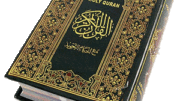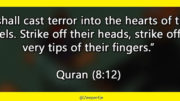The places of worship of most world religions are not usually linked to the storage of arms or the fomenting of sedition. Granted that you could do someone a pretty nasty injury with a big menorah from a synagogue or a Bishop’s crozier if you hit a person with them, but violence is not the primary intention behind the design of these items. However, you would be unlikely to find either a church, a synagogue or a Hindu temple being used to store weapons of war or promote war like attitudes to these religion’s neighbours who profess other faiths. Neither would you find any of these places of worship being used to hold women and children hostageUnfortunately that is not the case with Islamic places of worship. There have been a few cases over the last few years where mosques have been raided by soldiers or police in various nations and they have either found weapons of war being stored there or evidence that exhortations to commit violence against the Muslim’s neighbours stored within.
One of the more recent examples of this phenomena (ht ROP) comes from Uganda. It appears, according to a report by Deutsche Welle, that Ugandan police who were pursuing a suspect for a crime noticed that the person they were chasing ran into a mosque. The police entered the mosque and found that they had stumbled upon a massive arms cache along with evidence to show that this mosque was acting as a ‘radicalisation centre’.
After the suspect took sanctuary in the mosque there was a gunfight between the police and those in the mosque in which two of the shooters from the mosque were killed. When police went into the mosque after the firefight, they found arms, including bows and arrows, bullets and machetes. Chillingly over 100 women and children who had been kidnapped and who were being held against their will at the mosque. I defy anyone with half a brain to read the piece below and still say with a straight face that Islam is a ‘religion of peace’.
Deutsche Welle said:
Ugandan Police stumble upon Islamic radicalisation centre.
Police made the discovery after a suspect they were following bolted into the mosque, apparently seeking safe haven. Two suspects were killed during a shootout, after which police discovered dozens of hostages.
Its amazing to me that this den of savagery managed to exist in a busy capital like Kampala? Surely someone must have known about weapons being stored there along with captured women and children? You would think wouldn’t you that a big mosque (and this mosque would have had to be a considerable size to accommodate the number of people that are alleged to have been held there) would probably also have ordinary allegedly decent Muslims worshipping there who might have said something. Now either these individuals didn’t worship there or they did and said nothing, which is going to raise questions about how prevalent Islamic extremism is in Uganda and how much support it has among ordinary Muslims?
Deutsche Welle added:
Subsequently, 36 suspects were arrested and charged with hoarding weapons. Police also discovered 18 women and 94 children being held against their will inside the mosque.
“A number of children and women, suspected to either have been kidnapped or held hostage, were rescued,” police spokesman Emilian Kayima told a press conference on Saturday.
“Two of the hostage-takers were shot dead after violently attacking and severely injuring one of the security officers,” Kayima added.
Reading this story it seems to me that the Ugandan police have busted a pretty nasty nest of Islamic extremists. Although the presence of hostages and kidnap victims in the mosque is particularly shocking and unusual, the fact that weapons were found there is not so odd. There have been cases where lethal offensive weapons have been found in mosques in the United Kingdom, France, Spain and Germany. It is also highly likely that due to the warlike nature of Islam these examples may not be the only cases where Islamic places of worship may be harbouring extremists and their weapons. These may merely be the weapon caches that the authorities have discovered. There may be many others that have not yet been uncovered.
Who knows maybe the mosque down the road from you with the smiling Imam who goes to ‘interfaith’ meetings with naïve Christians and Jews and tells them that ‘Islam is a religion of peace’ are also storing offensive weapons? The problem is, we don’t know at present whether this is or is not the case. We do not know how many of the ostensibly peaceful mosques that have sprung up in our towns and cities are nothing of the sort?
The sheer number of incidents where mosques have either been used as arms stores, or which have been linked to extremism, is far far greater than the number of churches, synagogues, or temples where extremism or armaments have been discovered. This fact must surely justify, on both moral and common sense grounds, much greater controls being placed on mosques in non Muslim majority countries? At the very least we in non Muslim countries should insist that all mosques and Imams in our nations are licensed, that they speak only in the language of the host nation when giving sermons and that we put mosques under 24/7 audio and video surveillance. Short of forcibly closing these temples of hatred and horror, intrusive examination and monitoring of them may be the only way of ensuring that the followers of this religion of war are not preparing for war against the rest of us. I’m very much of the same mind as Queen Elizabeth the First when it comes to religious freedom, like her I do not want to have windows into men’s souls, people have a right to believe in whatever they want. But, when what you believe tells you to stockpile offensive weapons to use against your neighbours or capture women and children, then you have forfeited your right to be treated with respect and a right to practise your religion unhindered. Freedom of religion should not allow one religion to make war on another and as war has been an integral part of Islam since its foundation, we should be wary about treating Islam as ‘just another religion’. In the case of the Kampala mosque a major threat appears to have been neutralised but the question remains how many other mosques are behaving in exactly the same manner, not just in Uganda, but across the world?





